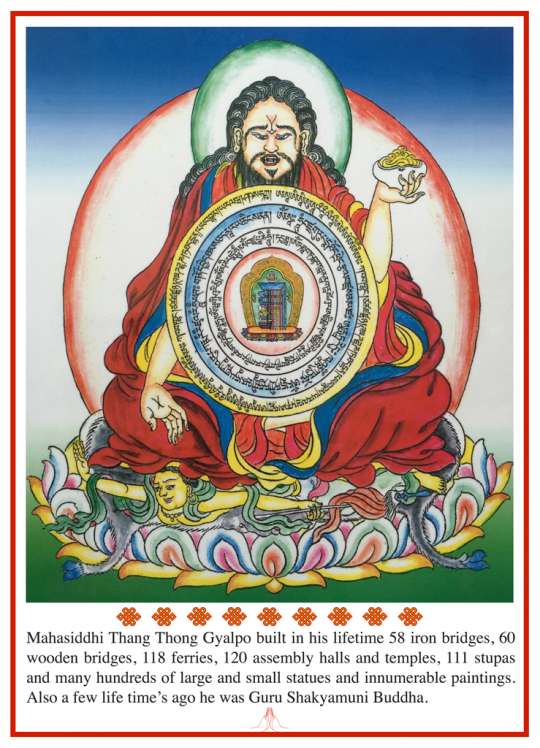- Home
- FPMT Homepage
Foundation for the Preservation of the Mahayana Tradition
The FPMT is an organization devoted to preserving and spreading Mahayana Buddhism worldwide by creating opportunities to listen, reflect, meditate, practice and actualize the unmistaken teachings of the Buddha and based on that experience spreading the Dharma to sentient beings. We provide integrated education through which people’s minds and hearts can be transformed into their highest potential for the benefit of others, inspired by an attitude of universal responsibility and service. We are committed to creating harmonious environments and helping all beings develop their full potential of infinite wisdom and compassion. Our organization is based on the Buddhist tradition of Lama Tsongkhapa of Tibet as taught to us by our founders Lama Thubten Yeshe and Lama Thubten Zopa Rinpoche.
- Willkommen
Die Stiftung zur Erhaltung der Mahayana Tradition (FPMT) ist eine Organisation, die sich weltweit für die Erhaltung und Verbreitung des Mahayana-Buddhismus einsetzt, indem sie Möglichkeiten schafft, den makellosen Lehren des Buddha zuzuhören, über sie zur reflektieren und zu meditieren und auf der Grundlage dieser Erfahrung das Dharma unter den Lebewesen zu verbreiten.
Wir bieten integrierte Schulungswege an, durch denen der Geist und das Herz der Menschen in ihr höchstes Potential verwandelt werden zum Wohl der anderen – inspiriert durch eine Haltung der universellen Verantwortung und dem Wunsch zu dienen. Wir haben uns verpflichtet, harmonische Umgebungen zu schaffen und allen Wesen zu helfen, ihr volles Potenzial unendlicher Weisheit und grenzenlosen Mitgefühls zu verwirklichen.
Unsere Organisation basiert auf der buddhistischen Tradition von Lama Tsongkhapa von Tibet, so wie sie uns von unseren Gründern Lama Thubten Yeshe und Lama Thubten Zopa Rinpoche gelehrt wird.
- Bienvenidos
La Fundación para la preservación de la tradición Mahayana (FPMT) es una organización que se dedica a preservar y difundir el budismo Mahayana en todo el mundo, creando oportunidades para escuchar, reflexionar, meditar, practicar y actualizar las enseñanzas inconfundibles de Buda y en base a esa experiencia difundir el Dharma a los seres.
Proporcionamos una educación integrada a través de la cual las mentes y los corazones de las personas se pueden transformar en su mayor potencial para el beneficio de los demás, inspirados por una actitud de responsabilidad y servicio universales. Estamos comprometidos a crear ambientes armoniosos y ayudar a todos los seres a desarrollar todo su potencial de infinita sabiduría y compasión.
Nuestra organización se basa en la tradición budista de Lama Tsongkhapa del Tíbet como nos lo enseñaron nuestros fundadores Lama Thubten Yeshe y Lama Zopa Rinpoche.
A continuación puede ver una lista de los centros y sus páginas web en su lengua preferida.
- Bienvenue
L’organisation de la FPMT a pour vocation la préservation et la diffusion du bouddhisme du mahayana dans le monde entier. Elle offre l’opportunité d’écouter, de réfléchir, de méditer, de pratiquer et de réaliser les enseignements excellents du Bouddha, pour ensuite transmettre le Dharma à tous les êtres. Nous proposons une formation intégrée grâce à laquelle le cœur et l’esprit de chacun peuvent accomplir leur potentiel le plus élevé pour le bien d’autrui, inspirés par le sens du service et une responsabilité universelle. Nous nous engageons à créer un environnement harmonieux et à aider tous les êtres à épanouir leur potentiel illimité de compassion et de sagesse. Notre organisation s’appuie sur la tradition guéloukpa de Lama Tsongkhapa du Tibet, telle qu’elle a été enseignée par nos fondateurs Lama Thoubtèn Yéshé et Lama Zopa Rinpoché.
Visitez le site de notre Editions Mahayana pour les traductions, conseils et nouvelles du Bureau international en français.
Voici une liste de centres et de leurs sites dans votre langue préférée
- Benvenuto
L’FPMT è un organizzazione il cui scopo è preservare e diffondere il Buddhismo Mahayana nel mondo, creando occasioni di ascolto, riflessione, meditazione e pratica dei perfetti insegnamenti del Buddha, al fine di attualizzare e diffondere il Dharma fra tutti gli esseri senzienti.
Offriamo un’educazione integrata, che può trasformare la mente e i cuori delle persone nel loro massimo potenziale, per il beneficio di tutti gli esseri, ispirati da un’attitudine di responsabilità universale e di servizio.
Il nostro obiettivo è quello di creare contesti armoniosi e aiutare tutti gli esseri a sviluppare in modo completo le proprie potenzialità di infinita saggezza e compassione.
La nostra organizzazione si basa sulla tradizione buddhista di Lama Tsongkhapa del Tibet, così come ci è stata insegnata dai nostri fondatori Lama Thubten Yeshe e Lama Zopa Rinpoche.
Di seguito potete trovare un elenco dei centri e dei loro siti nella lingua da voi prescelta.
- 欢迎 / 歡迎
简体中文
“护持大乘法脉基金会”( 英文简称:FPMT。全名:Foundation for the Preservation of the Mahayana Tradition) 是一个致力于护持和弘扬大乘佛法的国际佛教组织。我们提供听闻,思维,禅修,修行和实证佛陀无误教法的机会,以便让一切众生都能够享受佛法的指引和滋润。
我们全力创造和谐融洽的环境, 为人们提供解行并重的完整佛法教育,以便启发内在的环宇悲心及责任心,并开发内心所蕴藏的巨大潜能 — 无限的智慧与悲心 — 以便利益和服务一切有情。
FPMT的创办人是图腾耶喜喇嘛和喇嘛梭巴仁波切。我们所修习的是由两位上师所教导的,西藏喀巴大师的佛法传承。
繁體中文
護持大乘法脈基金會”( 英文簡稱:FPMT。全名:Found
ation for the Preservation of the Mahayana Tradition ) 是一個致力於護持和弘揚大乘佛法的國際佛教組織。我們提供聽聞, 思維,禪修,修行和實證佛陀無誤教法的機會,以便讓一切眾生都能 夠享受佛法的指引和滋潤。 我們全力創造和諧融洽的環境,
為人們提供解行並重的完整佛法教育,以便啟發內在的環宇悲心及責 任心,並開發內心所蘊藏的巨大潛能 — 無限的智慧與悲心 – – 以便利益和服務一切有情。 FPMT的創辦人是圖騰耶喜喇嘛和喇嘛梭巴仁波切。
我們所修習的是由兩位上師所教導的,西藏喀巴大師的佛法傳承。 察看道场信息:
- FPMT Homepage
- News/Media
-
- Study & Practice
-
-
- About FPMT Education Services
- Latest News
- Programs
- New to Buddhism?
- Buddhist Mind Science: Activating Your Potential
- Heart Advice for Death and Dying
- Discovering Buddhism
- Living in the Path
- Exploring Buddhism
- FPMT Basic Program
- FPMT Masters Program
- FPMT In-Depth Meditation Training
- Maitripa College
- Lotsawa Rinchen Zangpo Translator Program
- Universal Education for Compassion & Wisdom
- Online Learning Center
-
- Prayers & Practice Materials
- Overview of Prayers & Practices
- Full Catalogue of Prayers & Practice Materials
- Explore Popular Topics
- Benefiting Animals
- Chenrezig Resources
- Death & Dying Resources
- Lama Chopa (Guru Puja)
- Lama Zopa Rinpoche: Compendium of Precious Instructions
- Lama Zopa Rinpoche: Life Practice Advice
- Lama Zopa Rinpoche Practice Series
- Lamrim Resources
- Mantras
- Prayer Book Updates
- Purification Practices
- Sutras
- Thought Transformation (Lojong)
- Audio Materials
- Dharma Dates - Tibetan Calendar
- Translation Services
- Publishing Services
- Ways to Offer Support
- Prayers & Practice Materials
-
- Teachings and Advice
- Find Teachings and Advice
- Lama Zopa Rinpoche Advice Page
- Lama Zopa Rinpoche: Compendium of Precious Instructions
- Lama Zopa Rinpoche Video Teachings
- ༧སྐྱབས་རྗེ་བཟོད་པ་རིན་པོ་ཆེ་མཆོག་ནས་སྩལ་བའི་བཀའ་སློབ་བརྙན་འཕྲིན།
- Podcasts
- Lama Yeshe Wisdom Archive
- Buddhism FAQ
- Dharma for Young People
- Resources on Holy Objects
- Teachings and Advice
-
-
*If a menu item has a submenu clicking once will expand the menu clicking twice will open the page.
-
-
- Centers
-
- Teachers
-
- Projects
-
-
-
-
*If a menu item has a submenu clicking once will expand the menu clicking twice will open the page.
-
-
- FPMT
-
-
-
-
-
If you don’t know your own psychology, you might ignore what’s going on in your mind until it breaks down and you go completely crazy.
Lama Thubten Yeshe
-
-
-
- Shop
-
-
-
The Foundation Store is FPMT’s online shop and features a vast selection of Buddhist study and practice materials written or recommended by our lineage gurus. These items include homestudy programs, prayers and practices in PDF or eBook format, materials for children, and other resources to support practitioners.
Items displayed in the shop are made available for Dharma practice and educational purposes, and never for the purpose of profiting from their sale. Please read FPMT Foundation Store Policy Regarding Dharma Items for more information.
-
-
Lama Zopa Rinpoche News and Advice
30
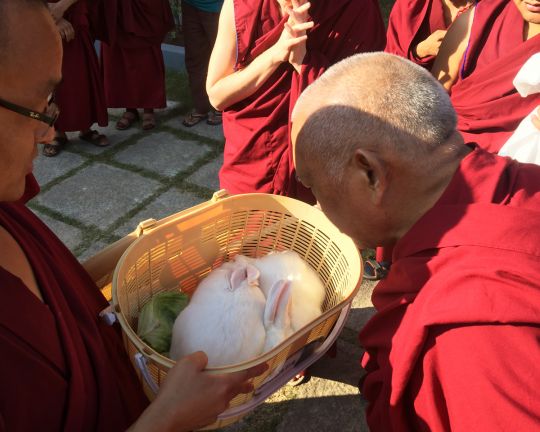
Lama Zopa Rinpoche blessing rabbits at Sera Je Monastery, India, January 2016. Photo by Ven. Roger Kunsang.
While staying at Osel Labrang at Sera Je Monastery in January 2016, Lama Zopa Rinpoche gave blessings to the rabbits there.
You can watch a video of the blessings on FPMT.org’s “Lama Zopa Rinpoche Videos” page, where short videos of Rinpoche teaching and giving blessings are collected and shared:
https://fpmt.org/media/streaming/videos-of-lama-zopa-rinpoche/
More information, photos and updates about FPMT spiritual director Lama Zopa Rinpoche can be found on Rinpoche’s webpage on FPMT.org. If you’d like to receive news of Lama Zopa Rinpoche and FPMT via email, sign up to FPMT News.
- Tagged: animal liberation, animals, lama zopa rinpoche, sera je monastery
- 0
26
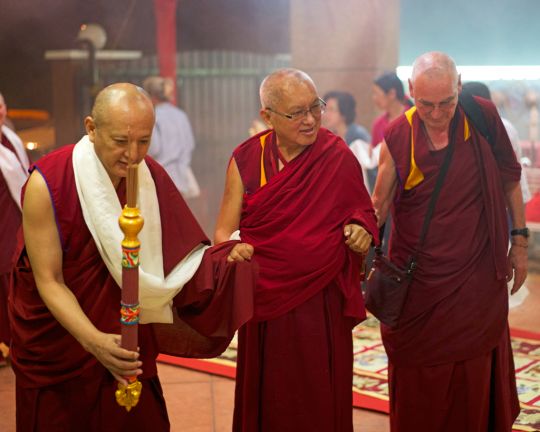
Lama Zopa Rinpoche arriving at Chokyi Gyaltsen Center, with resident teachers Geshe Deyang and Ven. Roger Kunsang, Penang, Malaysia, March 2016. Photo by Bill Kane.
Lama Zopa Rinpoche gave this teaching to about 50 ordained Sangha during a visit to a giant shopping mall in Kuala Lumpur, Malaysia, in April 2016. Rinpoche was in Kuala Lumpur giving teachings organized by Losang Dragpa Centre.
Think of the five aggregates: [form, feeling, discriminative awareness, compositional factors and consciousness]. Be mindful of how you label the aggregates, how in the beginning they are just merely labeled. Watch that.
In the next second the “I” is supposed to appear back to you merely labeled by the mind. That is what happens in reality, but that doesn’t happen.
The “I” is merely labeled by mind but it only appears like that to a buddha because buddhas don’t have even the subtle negative imprints – the obscurations to knowledge (Tib: she-drip) – left by the ignorance holding the “I” as truly existent. Having totally purified these, these have ceased [in a buddha’s mindstream]. There is no dualistic view, no hallucination, no projection when the “I” and all phenomena appear as truly existing from their own side, as real. A buddha does not have this hallucination at all. You have to understand that. What appears to a buddha is what is merely labeled by the mind.
But for us ordinary sentient beings, in the next second [Rinpoche snaps his fingers], it appears back not merely labeled by the mind. It appears back as the total opposite of that. That, in the Prasangika view, is the gag-cha, the object to be refuted. According to the Prasangika Madhyamaka, the second [subschool] of the Madhyamaka, gag-cha, the object to be refuted, is the total opposite to that; it appears back to you as not merely labeled by the mind. The real “I” that appears to you is the subtle gag-cha.
The Svatantrika subschool’s view is grosser. For them it appears as not labeled by mind and existing from its own side. Before I said “not merely labeled” but here it is not even labeled by the mind. They see the “I” that appears to you as truly existing from its own side, as real. It is much grosser.
Also, there’s the Mind Only school. They say the real “I” exists without depending on the imprints left on the seventh consciousness, [the mind basis of all, Skt: alaya vijnana], from which both subject and object arise.
According to the lower schools, what is one hundred percent to be abandoned is believing that the “I” truly exists and is self-sufficient and independent, that is to say, independent of other things such as the aggregates. That’s the very gross wrong view to be refuted.
The “I” appears to us as permanent, existing alone [unitary] and independent. When the “I” appears to you, all this is there. This way that the “I” appears to you is extremely gross. It’s the grossest hallucination. This is what is believed in Hinduism and for them this is the right view. For us, however, the way the “I” appears is the wrong view.
So, you see how all the other schools’ views of what gag-cha is – how the “I” appears to us – are to be totally abandoned as they are all the wrong view.
Not only the subject, the “I”, but also the action, the object, all the sounds, smells, tastes and tangible objects – all the six sense objects – are all merely labeled by the mind, by your mind. However, in the next second they don’t appear as merely labeled by the mind. They appear as not merely labeled by the mind. Everything that appears back to you – all these wrong views, right up to Svatantrika – appear as permanent and existing alone [as unitary], and with their own freedom [as independent.]
When you walk, there’s one meditation you can do. Everything, even subtle things, should appear merely labeled by mind – the “I,” action, object, everything. But, that doesn’t happen for us sentient beings. They do not appear not merely labeled by mind, even when you go to the supermarket. Whatever you look at – all these forms, all these many thousands and millions of things: the sky, the road, the people – all appear to you according to the wrong views described by all those schools. Meditate on that.
If you can recognize even what’s asserted by the lower schools, gradually you can recognize the wrong views to be refuted by Madhyamaka schools, first the Svatantrika’s and then the Prasangika’s.
The main thing is to think that all these things are like an illusion. As I’ve said before, ignorance is like the magician. It leaves a negative imprint on the mind, like a magician who uses mantras to cause hallucinations. The audience’s senses are “hallucinated,” seeing lapis lazuli palaces and all kinds of things. The magician has hallucinated the audience. Their senses are “illusioned.”
You’re illusioned by your ignorance. The magician is ignorance; you are the audience. All this is an illusion. I’m sitting here, you’re sitting there. We’re here having tea, but all of this is illusioned as real – real “I,” real restaurant, real tea, real snacks. All the rest is the same, appearing real.
Recognize all the wrong views, that in the end, all these are like hallucinations. You’re walking and you hallucinate the “I,” you hallucinate the action of walking, you hallucinate the road, you hallucinate the car, you hallucinate the building.
The other way to see it is as like a dream. Everything you look at is like a dream. You walk and you talk but [at the same time] the mind is practicing mindfulness, seeing it all as like a dream. You walk, talk, eat and so forth, but the most important thing is to recognize that this is all like a dream, like a hallucination, like an illusion, like a mirage.
When you do that, attachment doesn’t arise, anger doesn’t arise. There is no reason for anger or attachment to arise. That’s how it becomes the antidote to samsara, the antidote to ignorance.
Then, if it’s done with bodhichitta, thinking, “I must achieve enlightenment to benefit sentient beings, to free them from the oceans of samsara and bring them to enlightenment,” it becomes the cause of enlightenment.
From a talk given in Kuala Lumpur, Malaysia, in April2016. Transcribed by Ven. Thubten Munsel. Edited for inclusion on FPMT.org by Gordon McDougall.
CORRECTION: This teaching was giving in Kuala Lumpur in April 2016, not in Penang in March 2016 as first published. It has been corrected in the text.
Lama Zopa Rinpoche is the spiritual director of the Foundation for the Preservation of Mahayana Tradition (FPMT), a Tibetan Buddhist organization dedicated to the transmission of the Mahayana Buddhist tradition and values worldwide through teaching, meditation and community service.
23
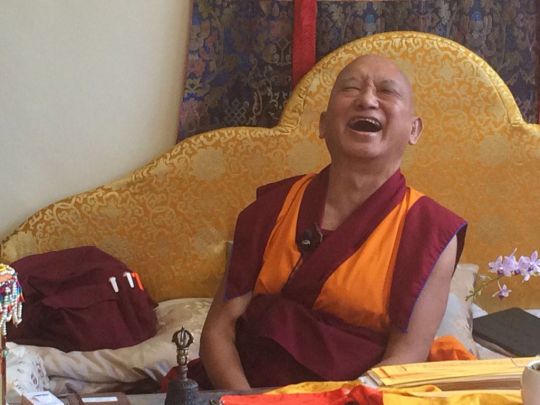
“Lama Zopa Rinpoche enjoying a very funny moment!” May 2016. Photo by Ven. Roger Kunsang via Twitter.
On May 20, Ven. Roger Kunsang shared on his Twitter page this very brief teaching from Lama Zopa Rinpoche:
Rinpoche was asked “what does rest mean to you?” Rinpoche replied “abiding in virtue!”
Video recordings from Rinpoche’s recent teaching tour in Southeast Asia now freely available on FPMT.org’s “Rinpoche Available Now” page:
https://fpmt.org/media/streaming/teachings-of-lama-zopa-rinpoche/
Ven. Roger Kunsang, Lama Zopa Rinpoche’s assistant and CEO of FPMT Inc., shares Lama Zopa Rinpoche’s recent pith sayings on Ven. Roger’s Twitter page.
More information, photos and updates about FPMT spiritual director Lama Zopa Rinpoche can be found on Rinpoche’s webpage. If you’d like to receive news of Lama Zopa Rinpoche via email, sign up to receive FPMT News.
- Tagged: lama zopa rinpoche, twitter
- 0
20
The Thang Thong Gyalpo protection PDF can be downloaded and printed.
“Rinpoche uses the example of a place in Solu Khumbu where all the houses were destroyed after the April 2015 earthquake except one house that had this protection on the walls,” Ven. Holly Ansett said about the protection. “Rinpoche has all the FPMT centers in Nepal displaying it.”
In related news, the website Pacifyearthquakes.org announced on May 17 that 1.6 million of the 1.8 million recitations of the Kshitigarbha long mantra have been accumulated to pacify earthquakes in California and around the world. Based on specific advice from Rinpoche, California Bay Area FPMT centers organized an effort to fulfill Rinpoche’s advice, which also included Tengyur recitations, Medicine Buddha pujas and eight Mahayana precepts accumulations. Students are still invited to recite the Kshitigarbha long mantra and contribute to the mantra count.
For more advice from Rinpoche on this topic, please see the page “Tsunami and Earthquakes”:
https://fpmt.org/teachers/zopa/advice/tsunami-and-earthquakes/
More information, photos and updates about FPMT spiritual director Lama Zopa Rinpoche can be found on Rinpoche’s webpage on FPMT.org. If you’d like to receive news of Lama Zopa Rinpoche and FPMT via email, sign up to FPMT News.
18
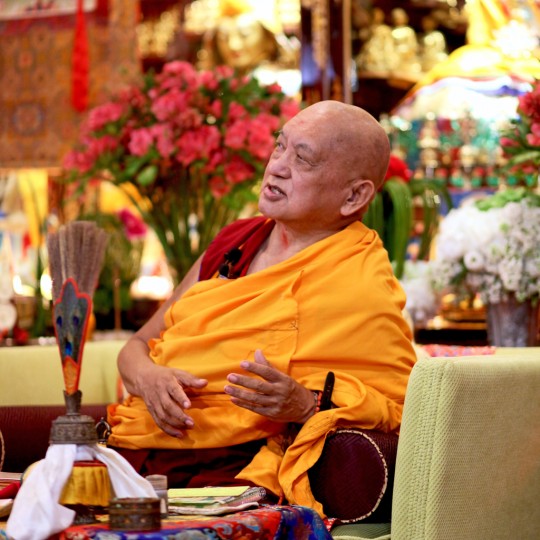
Lama Zopa Rinpoche teaching at Mahayana Buddhist Association, Hong Kong, May 2016. Photo by Ven. Lobsang Sherab.
On May 16, Ven. Roger Kunsang shared on his Twitter page this brief teaching from Lama Zopa Rinpoche:
“Lama Zopa; the real holiday is keeping the mind free of the eight worldly dharmas.”
Ven. Roger Kunsang, Lama Zopa Rinpoche’s assistant and CEO of FPMT Inc., shares Lama Zopa Rinpoche’s recent pith sayings on Ven. Roger’s Twitter page.
Video recordings from Rinpoche’s recent teachings at Mahayana Buddhist Association (Cham Tse Ling) in Hong Kong have just been added to the “Rinpoche Available Now” page on FPMT.org:
https://fpmt.org/media/streaming/teachings-of-lama-zopa-rinpoche/
More information, photos and updates about FPMT spiritual director Lama Zopa Rinpoche can be found on Rinpoche’s webpage. If you’d like to receive news of Lama Zopa Rinpoche via email, sign up to receive FPMT News
- Tagged: eight worldly dharmas, lama zopa rinpoche, twitter
- 0
15
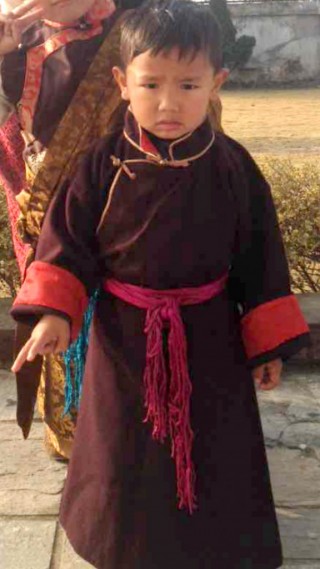
Tenzin Rigsel
Lama Zopa Rinpoche sent the following message upon the announcement that His Holiness the Dalai Lama officially recognized the three-year-old Tenzin Rigsel as the reincarnation of the beloved former abbot of Kopan Monastery Khensur Rinpoche Lama Lhundrup Rigsel.
My dear students seeking total elimination of suffering and completion of Buddhahood, and my dear friends,
This news is so great and encouraging to our minds, to develop Dharma wisdom and compassion to all sentient beings, whose minds are obscured and suffering, and to help with our body, speech and mind, and bring perfect peace and happiness in this world, at least.
This is just about one time that we have received this perfect human rebirth and met the Buddha Dharma, with the opportunity to learn and practice and to overcome the oceans of samsaric sufferings, by overcoming delusion and karma – including laziness, not laziness towards removing suffering and its causes, but laziness in Dharma practice and achieving enlightenment.
This is to inform you the ex-abbott of Kopan Monastery Lama Lhundrup, who is heart disciple of Lama Yeshe, who is kinder than all the three time Buddhas, including Buddha Vajradhara. Lama Lhundrup was invited by Lama Yeshe to look after Kopan Monastery and was the principal teacher of the monks and nuns, giving advice and looking after the Dharma discipline. Then after Lama Yeshe showed the aspect of passing away, Lama Lhundrup looked after the finances and with all his heart and life he looked after Kopan Monastery. It was from Kopan Monastery that FPMT started. Lama Lhundrup also dedicated and put effort into developing Lama Tsongkhapa’s teachings in Kopan and in all of Nepal.
Now Lama Lhundrup has been recognized by Buddha Chenrezig His Holiness the Dalai Lama, who said, “Tenzin Rigsel to be recognized as a reincarnation of the late Lhundrup Rigsel comes out extremely positive.”
What made Lama Lhundrup to have this special reincarnation was his pure morality, compassion to sentient beings and wish to liberate all sentient being by spreading the teachings of Lama Tsongkhapa. I think this incarnation will be continually more and more beneficial as his life goes on and also as his lives go on.
Please everybody enjoy, especially the students in the East and the West.
With much love and prayers,
Lama Zopa
Lama Zopa Rinpoche is the spiritual director of the Foundation for the Preservation of Mahayana Tradition (FPMT), a Tibetan Buddhist organization dedicated to the transmission of the Mahayana Buddhist tradition and values worldwide through teaching, meditation and community service.
You can read more about Tenzin Rigsel’s recognition on FPMT.org.
- Tagged: khensur rinpoche lama lhundrup, kopan monastery, lama zopa rinpoche, thubten rigsel rinpoche
- 0
13
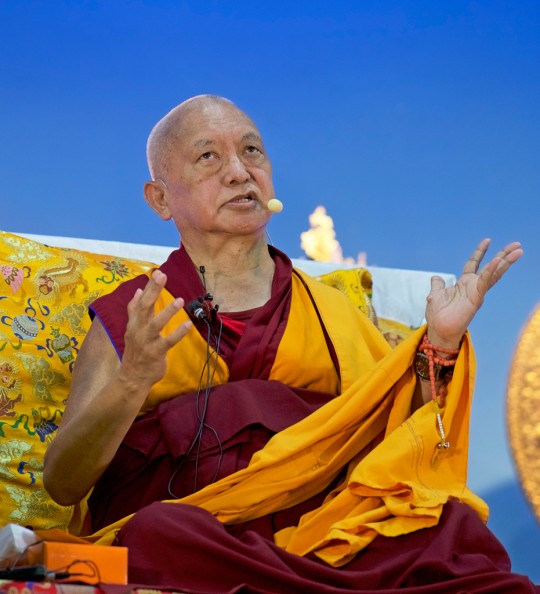
Lama Zopa Rinpoche teaching at Rinchen Jangsem Ling, Malaysia, April 2016. Photo by Bill Kane.
During the Medicine Buddha retreat at Rinchen Jangsem Ling in Malaysia in April, Lama Zopa Rinpoche gave an exceptional teaching on emptiness over two sessions on April 14, which can be watched online with all of Rinpoche’s other teachings in Malaysia.
Here is a short excerpt from the lightly edited transcript of the teaching:
“… I explained one night – night or day I don’t remember – that the I exists in mere name, merely labeled by the mind, by the valid mind, because there is a valid base, the aggregates. So the five aggregates we have, the association of that is the valid base, the aggregates, a valid base. The base to be labeled I, self, I, not this eye with which you can see things but the I, the self. And the ‘I’ is the label. The aggregates are the base to be labeled and the I is what is labeled on that. Those two do not exist separately but they exist differently. That is important to know. They do not exist separately like the self, the I, and the table, throne, or light. They do not exist separately from the aggregates but they exist differently: one is the base to be labeled and one, the I, is what is labeled on that. The I is also merely labeled by the valid mind. It exists in mere name, merely labeled by the valid mind, because there is a valid base. I, action, object, also object, what is the object? In reality it exists in mere name, merely labeled by the mind, by the valid mind, because there is a valid base. Like that the whole entire hell and enlightenment, samsara and nirvana, happiness and problems in everyday life, so everything, everything exists in mere name. What exists is in mere name, merely labeled by the mind.
“So it is explained, let me see if I can remember, what exists is explained in the Madhyamaka: that which does not receive harm from the absolute wisdom. So the real I, truly existent I, I existing from its own side, I existing by its nature, in our common language the real I, so that is what is totally empty. It does not exist at all. That real I receives harm from the absolute wisdom, the wisdom realizing absolute truth, emptiness only. It receives harm from that. Because that wisdom, absolute wisdom, that ultimate wisdom, sees the real I, what appears to us from beginningless rebirths up to now, from this morning, from birth, from beginningless rebirths, and you hundred percent without doubt you believe it, and you work for it, you believe and work for it, your body, speech, and mind works for the real I. Do you understand? For the real I.
“There are numberless buddhas and non-bodhisattva, numberless ordinary sentient beings, arhats, bodhisattvas, ordinary sentient beings, arhats, arya sangha, the ordinary sentient beings, they are numberless, numberless hell beings, hungry ghosts, animals, human beings, sura beings, asura beings, intermediate state beings. They are numberless, but you from beginningless rebirths up to now have been working only for the real I, working for the real I from beginningless rebirths, not only now, but it didn’t exist. You understand? But it didn’t exist, at all. You understand? That you have to know, to realize, to discover. …”
Watch Rinpoche teach on emptiness at Rinchen Jangsem Ling: 6 p.m. teaching (https://youtu.be/aNcQo1yBW7Y), 8 p.m. teaching (https://youtu.be/SK5Ibft87LI)
Free, on-demand videos of many of Rinpoche’s international teachings are made available on FPMT’s Rinpoche Available Now page.
Lama Zopa Rinpoche is the spiritual director of the Foundation for the Preservation of Mahayana Tradition (FPMT), a Tibetan Buddhist organization dedicated to the transmission of the Mahayana Buddhist tradition and values worldwide through teaching, meditation and community service.
- Tagged: emptiness, essential extract, lama zopa rinpoche, ran, rinchen jangsem ling, video
- 0
11
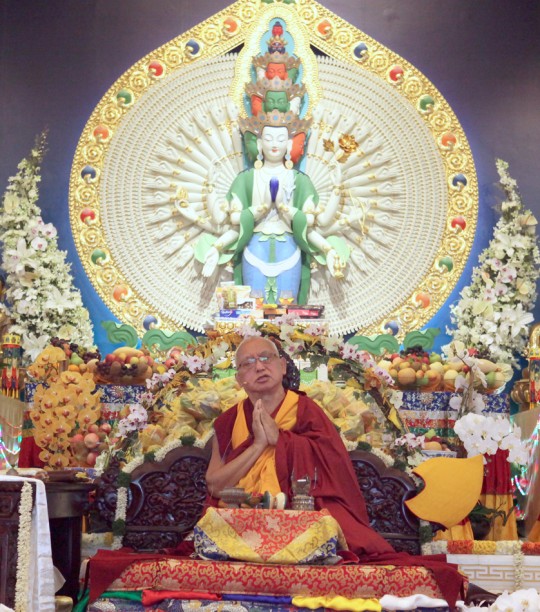
Lama Zopa Rinpoche during the long life puja for him at Amitabha Buddhist Centre, Singapore, March 13, 2016. Photo by Ven. Lobsang Sherab.
The long life puja for Lama Zopa Rinpoche held in March at Amitabha Buddhist Centre (ABC) in Singapore brought FPMT students together from around the world. Ven. Roger Kunsang, CEO of FPMT, wrote of the puja, “[It] went very well. I think this was due to so many people making the effort to come, and so many making the effort to participate in some way in the puja. ABC staff and students made such an excellent effort in organizing and hosting the event.”
Amitabha Buddhist Centre recently published a short video called “Prelude to a Puja,” which highlights how remarkable the puja was and shares a small glimpse into the preparations that went into it.
Watch “Prelude to a Puja” on YouTube:
https://youtu.be/X7L4mZW_WBc
The long life puja for Rinpoche was offered by the entire FPMT organization to dispel any obstacles for Rinpoche this year based on advice from Khadro-la (Rangjung Neljorma Khadro Namsel Drönme). More than 100 representatives from FPMT centers, project, services, and national and regional offices worldwide attended the puja and participated in the offering procession. The entire puja can be watched on FPMT’s YouTube channel:
https://www.youtube.com/playlist?list=PLd3YWIA0vLx_YFdzi_rVxmE3mLUfd1AUA
FPMT’s Long Life Puja Fund gives students an opportunity to support the long life pujas offered by FPMT to Lama Zopa Rinpoche and to His Holiness the Dalai Lama. To learn more about the benefits of long life pujas and the fund, and to make donations, please visit the Long Life Puja Fund page:
https://fpmt.org/projects/fpmt/long-life-puja/
More information, photos and updates about FPMT spiritual director Lama Zopa Rinpoche can be found on Rinpoche’s webpage on FPMT.org. If you’d like to receive news of Lama Zopa Rinpoche and FPMT via email, sign up to FPMT News.
- Tagged: amitabha buddhist centre, lama zopa rinpoche, long life puja, long life puja fund, singapore
- 0
9
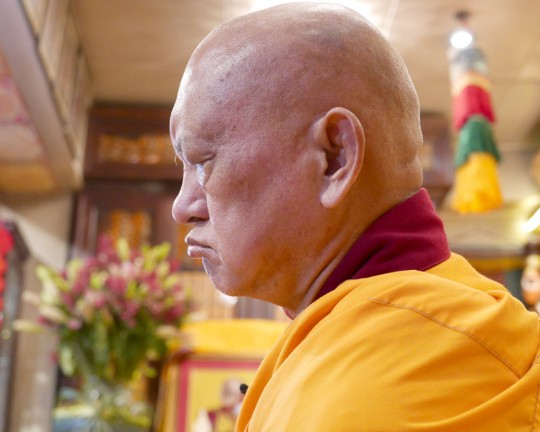
Lama Zopa Rinpoche at Cham Tse Ling, Hong Kong, April 2016. Photo by Ven. Roger Kunsang.
“If we have very strong guru devotion to all the gurus from whom we have received a Dharma connection, even an oral transmission of a mantra or whatever, so to everyone, we look at them as a buddha from our side,” Lama Zopa Rinpoche taught in March 2000 in Melbourne, Australia, published as “Make the Mind Wet” in Lama Yeshe Wisdom Archive’s April 2016 e-letter.
“… It’s not a dry mind where there’s no wetness of devotion. It’s not like a desert, a hot desert place where there’s no water and nothing grows. It’s not like that. Our mind is filled with devotion by seeing everyone that we have a connection with as a buddha. Our mind is very much in a positive state, it’s a positive mind toward them, a pure mind toward them, like that.
“The stronger devotion there is, then the experience of other meditations – whether it’s emptiness, whether it’s compassion or whether it’s impermanence, anything – is very easy to experience, very easy to feel. When our mind has strong guru devotion then also the prayers like Guru Puja and so forth, any prayer, any meditation or lam-rim prayer, that we didn’t have any feeling before; when our mind is in a great devotional state toward the guru then the same prayer that we have been saying for many years, for a long time now, with every single word we find great taste. With every single word we find great taste, great meaning, it’s very rich. While we’re saying the prayer, we feel the meaning in our heart.
“While we’re saying the prayer we feel the meaning of it in our heart. While we’re doing the prayer, our mind feels the meaning of the prayer. Before it was just words, but now with this strong guru devotion, while we’re saying the prayer our mind feels the meaning of the prayer. We experience the meaning of the prayer. Then we feel the prayer that we have been reciting is so precious, such a precious one, we feel that. …”
Watch “Make the Mind Wet” on Youtube:
https://youtu.be/aM89A7m23Ss?list=PLeGpGqjz7TIUwyf7ea19KYjnoka6DQIgE
You can read Lama Yeshe Wisdom Archive’s April 2016 e-letter to find the complete “Make the Mind Wet” and other teachings from Lama Zopa Rinpoche:
https://lamayeshe.com/article/e-letter-no-154-april-2016
Lama Zopa Rinpoche is the spiritual director of the Foundation for the Preservation of Mahayana Tradition (FPMT), a Tibetan Buddhist organization dedicated to the transmission of the Mahayana Buddhist tradition and values worldwide through teaching, meditation and community service.
6
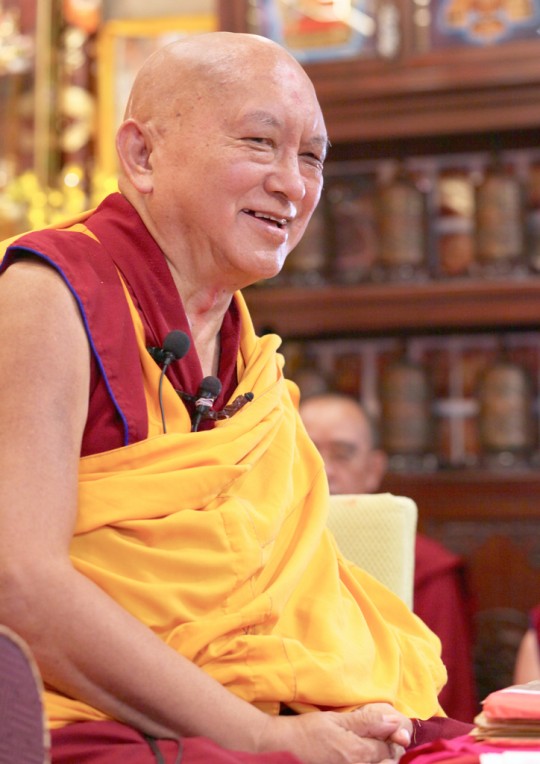
Lama Zopa Rinpoche at Cham Tse Ling, Hong Kong, April 2016. Photo by Ven. Lobsang Sherab.
On April 28, Ven. Roger Kunsang shared on his Twitter page this brief teaching from Lama Zopa Rinpoche:
“Normally people think happiness and suffering comes from outside. That’s not true! Happiness and suffering depends on the way you think.”
Video recordings from Rinpoche’s recent teachings at Amitabha Buddhist Centre in Singapore and at Chokyi Gyaltsen Center, Losang Dragpa Centre, Kasih Hospice and Rinchen Jangsem Ling in Malaysia are now available on FPMT.org. And Rinpoche’s teachings in Hong Kong will be added soon to the “Rinpoche Available Now” page:
https://fpmt.org/media/streaming/teachings-of-lama-zopa-rinpoche/
Ven. Roger Kunsang, Lama Zopa Rinpoche’s assistant and CEO of FPMT Inc., shares Lama Zopa Rinpoche’s recent pith sayings on Ven. Roger’s Twitter page.
More information, photos and updates about FPMT spiritual director Lama Zopa Rinpoche can be found on Rinpoche’s webpage. If you’d like to receive news of Lama Zopa Rinpoche via email, sign up to receive FPMT News.
- Tagged: lama zopa rinpoche, twitter
- 0
4
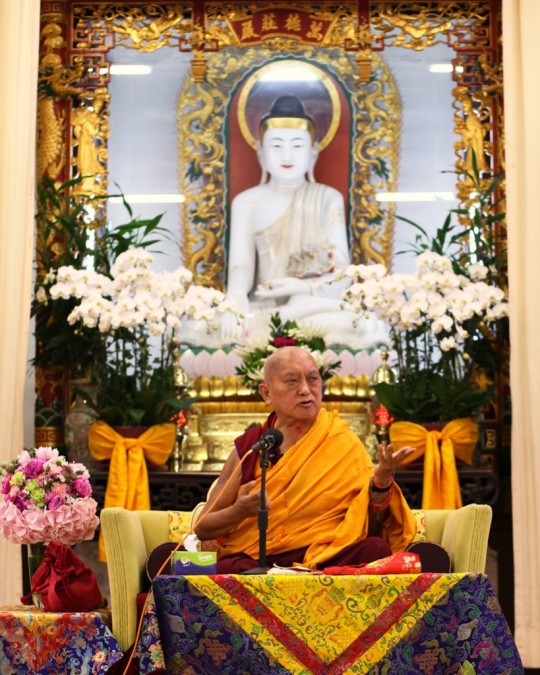
Lama Zopa Rinpoche during a public teaching organized by Mahayana Buddhist Association (Cham Tse Ling) at Buddhist Wong Fung Ling College, Hong Kong, May 2016. Photo by Ven. Lobsang Sherab.
Lama Zopa Rinpoche arrived in Hong Kong last week. During his first few days there, Rinpoche visited a student in critical condition in an intensive care unit and did prayers for him. Rinpoche over the next few days did an extensive Medicine Buddha puja in the gompa of Mahayana Buddhist Association (Cham Tse Ling), the FPMT center in Hong Kong, that went until 6 a.m., specifically for a few students in Hong Kong who are seriously ill. Rinpoche also recited the Guhyasamaja root tantra for a sick student. And during an outing on a naga day, Rinpoche went to the harbor and offered a naga torma.
Cham Tse Ling organized the events with Rinpoche, which included a Vajrayogini initiation at the center on April 28-30, a public teaching on May 1 and a Vajrapani, Hayagriva and Garuda jenang on May 2.
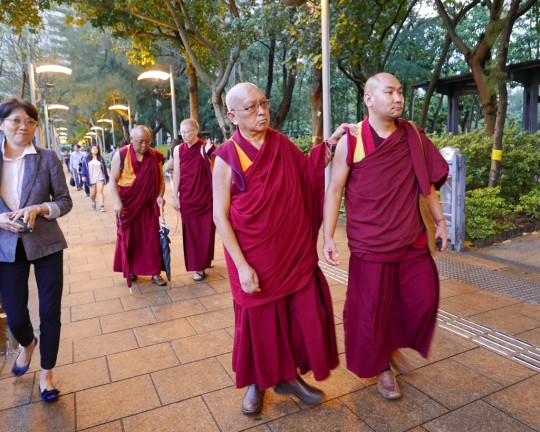
Lama Zopa Rinpoche getting some exercise in a park with (from left) Esther Ngai, Ven. Tenzin Pemba, Ven. Holly Ansett and Ven. Thubten Tendar, Hong Kong, April 2016. Photo by Ven. Roger Kunsang.
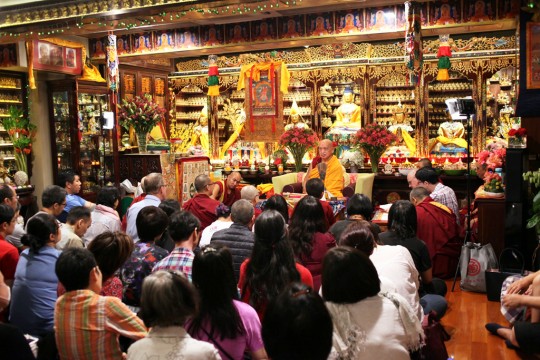
Rinpoche with students in the gompa at Cham Tse Ling, Hong Kong, April 2016. Photo by Ven. Lobsang Sherab.
About 160 people squeezed into the small yet very beautiful Cham Tse Ling gompa and one additional room that had a video feed for the Vajrayogini initition. The initiation was scheduled for two days, but took an extra day, finally ending at 4 a.m.
The public teaching on May 1 took place at a larger venue and included Rinpoche giving an oral transmission of The Method to Transform a Suffering Life into Happiness (Including Enlightenment) with Blessing the Speech and Daily Mantras. Both the teaching on May 1 and the teaching before the May 2 jenang were streamed live over the internet and can be watched as recordings on FPMT’s Livestream page (http://livestream.com/FPMT/HKK2016).
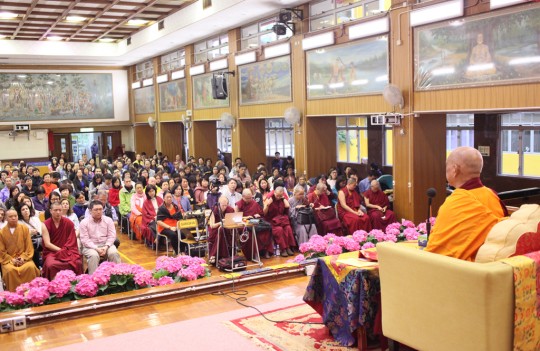
Lama Zopa Rinpoche during a public teaching organized by Cham Tse Ling at Buddhist Wong Fung Ling College, Hong Kong, May 2016. Photo by Ven. Lobsang Sherab.
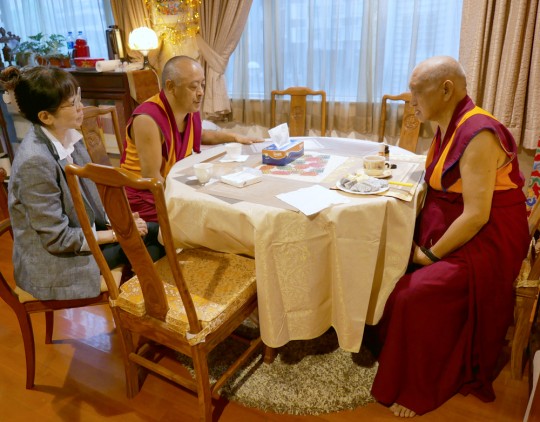
Lama Zopa Rinpoche with Ven. Tenzin Pemba and Esther Ngai, who serve as co-directors for Mahayana Buddhist Center (Cham Tse Ling) and who took care of everything very well, Hong Kong, April 2016. Photo by Ven. Roger Kunsang.
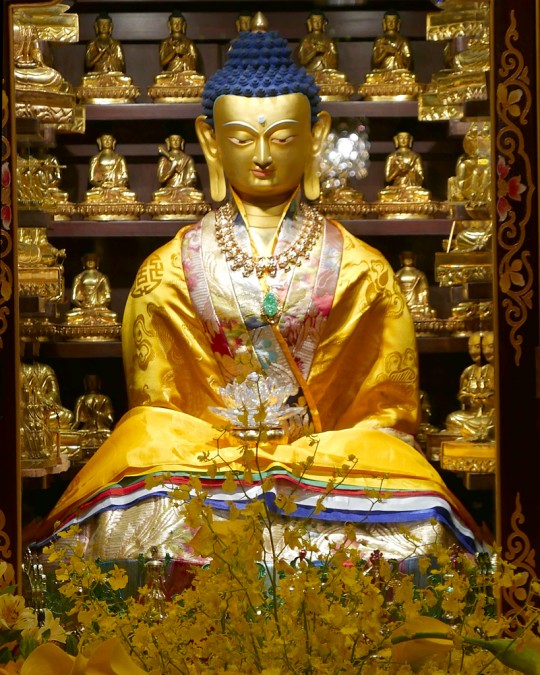
A close-up of a statue that is part of Cham Tse Ling’s beautiful and intricate altar, Hong Kong, April 2016. Photo by Ven. Roger Kunsang.
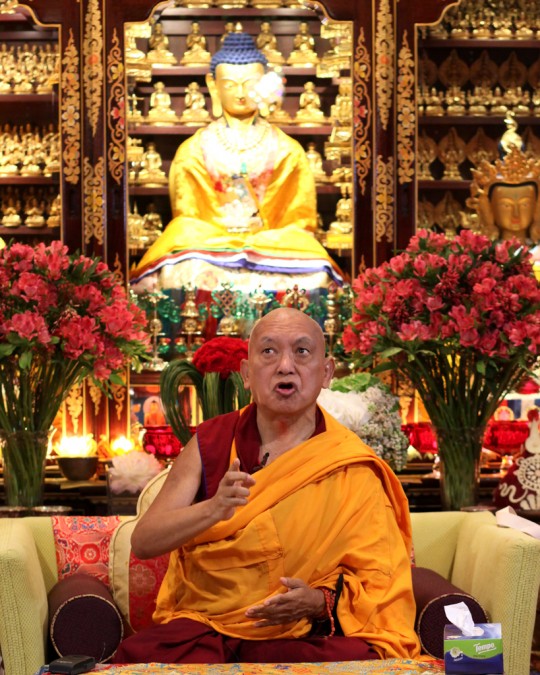
Rinpoche teaching at Cham Tse Ling, Hong Kong, April 2016. Photo by Ven. Lobsang Sherab.
Video recordings from Rinpoche’s recent teachings at Amitabha Buddhist Centre in Singapore and at Chokyi Gyaltsen Center, Losang Dragpa Centre, Kasih Hospice and Rinchen Jangsem Ling in Malaysia are now available at:
https://fpmt.org/media/streaming/teachings-of-lama-zopa-rinpoche/
Lama Zopa Rinpoche is the spiritual director of the Foundation for the Preservation of Mahayana Tradition (FPMT), a Tibetan Buddhist organization dedicated to the transmission of the Mahayana Buddhist tradition and values worldwide through teaching, meditation and community service.
2
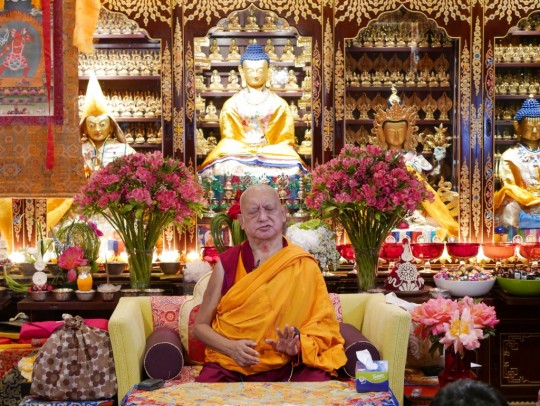
Lama Zopa Rinpoche teaching at Mahayana Buddhist Association (Cham Tse Ling) in Hong Kong, May 2016
On April 28, Ven. Roger Kunsang shared on his Twitter page this brief teaching from Lama Zopa Rinpoche:
Lama Zopa; main way to protect yourself is for you to not harm others! It’s not sufficient to just study Dharma, you have to put it into practice!
Rinpoche arrived last week in Hong Kong to give teachings and initiations organized by Mahayana Buddhist Association (Cham Tse Ling). You can watch Rinpoche give teachings in Hong Kong on FPMT Livestream page:
http://livestream.com/FPMT/HKK2016
Ven. Roger Kunsang, Lama Zopa Rinpoche’s assistant and CEO of FPMT Inc., shares Lama Zopa Rinpoche’s recent pith sayings on Ven. Roger’s Twitter page.
More information, photos and updates about FPMT spiritual director Lama Zopa Rinpoche can be found on Rinpoche’s webpage. If you’d like to receive news of Lama Zopa Rinpoche via email, sign up to receive FPMT News.
- Tagged: hong kong, lama zopa rinpoche, twitter
- 0
- Home
- News/Media
- Study & Practice
- About FPMT Education Services
- Latest News
- Programs
- New to Buddhism?
- Buddhist Mind Science: Activating Your Potential
- Heart Advice for Death and Dying
- Discovering Buddhism
- Living in the Path
- Exploring Buddhism
- FPMT Basic Program
- FPMT Masters Program
- FPMT In-Depth Meditation Training
- Maitripa College
- Lotsawa Rinchen Zangpo Translator Program
- Universal Education for Compassion & Wisdom
- Online Learning Center
- Prayers & Practice Materials
- Overview of Prayers & Practices
- Full Catalogue of Prayers & Practice Materials
- Explore Popular Topics
- Benefiting Animals
- Chenrezig Resources
- Death & Dying Resources
- Lama Chopa (Guru Puja)
- Lama Zopa Rinpoche: Compendium of Precious Instructions
- Lama Zopa Rinpoche: Life Practice Advice
- Lama Zopa Rinpoche Practice Series
- Lamrim Resources
- Mantras
- Prayer Book Updates
- Purification Practices
- Sutras
- Thought Transformation (Lojong)
- Audio Materials
- Dharma Dates – Tibetan Calendar
- Translation Services
- Publishing Services
- Teachings and Advice
- Find Teachings and Advice
- Lama Zopa Rinpoche Advice Page
- Lama Zopa Rinpoche: Compendium of Precious Instructions
- Lama Zopa Rinpoche Video Teachings
- ༧སྐྱབས་རྗེ་བཟོད་པ་རིན་པོ་ཆེ་མཆོག་ནས་སྩལ་བའི་བཀའ་སློབ་བརྙན་འཕྲིན།
- Podcasts
- Lama Yeshe Wisdom Archive
- Buddhism FAQ
- Dharma for Young People
- Resources on Holy Objects
- Ways to Offer Support
- Centers
- Affiliates Area
- Teachers
- Projects
- Charitable Projects
- Make a Donation
- Applying for Grants
- News about Projects
- Other Projects within FPMT
- Support International Office
- Projects Photo Galleries
- Give Where Most Needed
- FPMT
- Shop
Translate*
*powered by Google TranslateTranslation of pages on fpmt.org is performed by Google Translate, a third party service which FPMT has no control over. The service provides automated computer translations that are only an approximation of the websites' original content. The translations should not be considered exact and only used as a rough guide.Don’t think of Buddhism as some kind of narrow, closed-minded belief system. It isn’t. Buddhist doctrine is not a historical fabrication derived through imagination and mental speculation, but an accurate psychological explanation of the actual nature of the mind.









